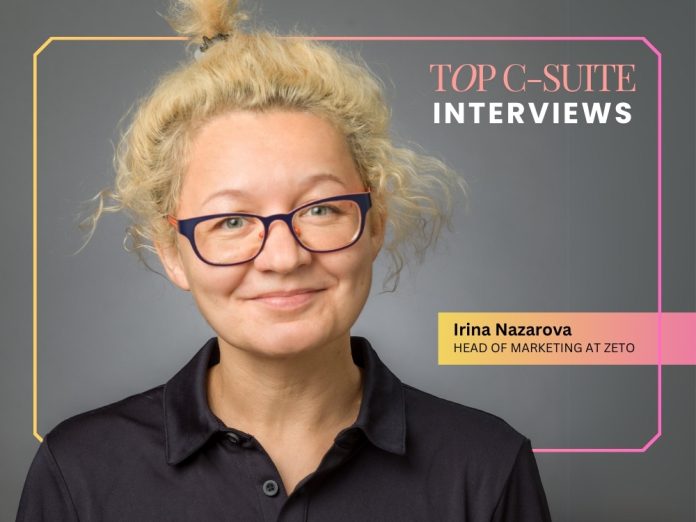Interview with Irina Nazarova, Head of Marketing at Zeto
In this interview, Irina Nazarova discusses how AI is transforming healthcare marketing. She explains the way AI enhances patient engagement, personalizes strategies, and improves outcomes. Irina addresses ethical considerations, real-world challenges, and provides practical advice on leveraging AI tools effectively, offering insights into navigating regulations, patient expectations, and technological advancements.
Against the backdrop of Irina Nazarova’s career, where she has been at the helm of marketing endeavors for companies like Brain Scientific (BRSF) and currently as the Head of Marketing at Zeto, we’ll envision the future landscape of healthcare marketing. Irina, how do you see AI shaping this landscape, and what opportunities does it unveil for marketers and healthcare providers alike?
AI truly transforms every sector by providing efficiency, automation, personalization, and predictive analytics. In the realm of healthcare marketing, AI proves particularly invaluable. It streamlines creating content like blogs, videos, photographs, emails, presentations, and scripts; it can also enhance SEO practices. Moreover, AI can refine digital advertising campaigns. AI chatbots can kickstart patient engagement and provide personalized communication around the clock.
Within healthcare more broadly, AI significantly elevates the quality of diagnostics and medical services. It plays a crucial role in developing new medications and analyzing vast amounts of medical data, improving diagnostic precision. It can also help reduce healthcare expenditures.
Overall, AI efficiently handles routine tasks that would otherwise occupy medical staff, allowing them to focus more on patient care.
In the EEG field specifically I see the integration of AI into seizure detection software that helps detect seizures in real-time and send notifications to personnel.
When planning my marketing strategy for this year, I conducted research and compiled a list of AI tools that could be useful. I am gradually integrating them into my workflows. For example, AI-powered SEO tools are aiding in keyword analysis. Currently, I’m using out-of-the-box AI solutions, but I see many advantages in developing a custom one.
Imagine a scenario where AI becomes the backbone of healthcare marketing, seamlessly integrating with patient journeys. Could you share examples of how AI technologies are currently reshaping marketing strategies to deepen patient engagement and enhance overall outcomes?
This year, I had my first experience riding in a driverless, AI-enabled car, and it was an entirely new experience for me as a user. Imagine calling an Uber, and an autonomous car shows up! These vehicles demonstrate how companies can use AI to create innovative ways to interact with customers. They’ll want to share these memorable experiences on social media. Marketing approaches are already changing, and this is just the beginning.
Let’s talk about my everyday experience in healthcare marketing strategy: AI actively helps to optimize marketing campaigns. It analyzes patient reactions to various marketing initiatives and automatically adjusts strategies, for instance, by changing content, distribution channels, or the timing of campaigns to enhance their effectiveness. This allows for more precise and efficient targeting of the audience. I remember another project I worked on as the Marketing Director at Brain Scientific. I needed unique illustrations for a new patient presentation, and I used DALL·E for the first time. The results were strikingly unusual; the process was not only incredibly fast but also completely free! DALL·E helped me generate images in multiple styles, which allowed me to customize the visuals precisely to the theme of the presentation.
I would also highlight chatbots, which we have grown accustomed to. Sometimes, they can be annoying — but they represent an effective tool for communicating with patients. Using AI to manage chatbots that provide 24/7 support, answer patient questions and help with booking appointments enhances patient satisfaction and ensures continuous interaction with medical institutions.
Another benefit is personalization: AI analyzes patients’ behavior on the website, their habits and preferences, to create custom offers and content. Overall it’s crucial to be on top of new developments and implement AI tools to make your marketing strategy more productive — and competitive.
Reflect on the vast ocean of healthcare data — how can marketers navigate this sea with AI as their compass, steering toward personalized strategies that resonate with individual patients while safeguarding their privacy and security?
It’s pretty straightforward: in the context of personalization, data is key. The more data we use, the better we understand patient needs and preferences. AI, combined with data analytics, allows us to gather information from website interactions, social media activity, customer service chat history, mobile apps, and more. Data analytics solutions can sift through this sea of information to gain a deeper understanding of patient trends, behaviors, and inclinations.
AI achieves this through machine learning algorithms, which enable it to identify trends and forecast outcomes. This paves the way for real-time personalization that was once considered unattainable. For example, AI can analyze a patient’s health history, test results, and responses to treatment to suggest lifestyle recommendations.
In healthcare, to protect the privacy and security of patient data, it’s essential to use encrypted and anonymized data during the AI training process. Moreover, it’s crucial to strictly adhere to regulatory requirements, such as HIPAA in the U.S., which govern the processing of medical data. These measures not only help protect patient information but also enhance their trust in the use of AI in medical institutions.
Consider a world where AI-driven chatbots become virtual companions on patients’ healthcare journeys, offering real-time support and information. How can marketers ensure these interactions strike the delicate balance between technological efficiency and human empathy?
Envisioning AI-driven chatbots as full companions in healthcare journeys is quite an exciting prospect, isn’t it? We’re definitely on our way there. Currently, many healthcare systems have started using chatbots, but these primarily provide instant answers to common questions. The real challenge — and opportunity — lies in evolving these chatbots into true companions that can offer nuanced support throughout a patient’s healthcare experience.
One major hurdle is ensuring chatbots provide accurate information. It’s critical that they’re not only programmed with extensive medical knowledge but also continually updated and checked against the most current research. And, of course, this needs to be overseen by healthcare professionals to maintain trust.
Integration of human oversight is essential. No matter how advanced chatbots become, there should always be a straightforward way for patients to connect with a human healthcare provider. Patients often need reassurance or face complex issues that only humans can manage effectively.
Speaking of the human touch, tools like the IBM Watson Tone Analyzer are becoming key. They allow chatbots to adapt to the emotional tone of a conversation. This capability is incredibly important — it helps chatbots respond not just with the right information, but also in a way that acknowledges the patient’s emotional state, making the interaction feel more empathetic.
What ethical considerations should be taken into account to safeguard patient privacy and data security in this AI-driven landscape?
The integration of AI in healthcare brings up serious ethical considerations, especially concerning patient privacy and data security. It’s essential to clarify who owns patient data — whether it’s the patient, healthcare provider, or the AI developer — and to ensure that robust security measures are in place to protect sensitive health information from being mishandled or exploited.
Another significant concern is the commercialization of patient data. Patients are rightly worried their information could be used for research, product development, or marketing without their consent. Tackling this will require stricter regulations and transparency in how medical data is used. AI developers and policymakers must work together to create tools that not only enhance healthcare but also prioritize patient privacy, informed consent, and data security. Ultimately, ensuring that AI implementations in healthcare are patient-centric and respect privacy rights is paramount.
Think of the challenges that lie ahead as marketers harness AI’s potential in healthcare. How can these hurdles be turned into stepping stones, allowing marketers to navigate the evolving terrain of regulations, patient expectations, and technological advancements?
Harnessing AI in healthcare marketing comes with challenges, but these can be transformed into opportunities. For instance, navigating the maze of regulations like HIPAA can be tough. Marketers can get ahead of this by stepping up their game in compliance and transparency. This isn’t just about meeting legal requirements — it’s a chance to build trust and show that your brand leads the way in the use of ethical AI.
As technology rapidly evolves, keeping up can feel like a race. However, embracing continuous learning and staying open to innovation can make these advancements into stepping stones to success.
How can marketers not only adapt but also lead in leveraging AI innovations, making sure their strategies are both modern and effective in the healthcare marketing landscape?
To really stay ahead with AI in healthcare marketing, it’s all about keeping up-to-date with the latest tech and how it can be applied. There’s some talk out there about AI possibly replacing marketing jobs, but I see it differently. I think AI is more about taking the repetitive tasks off our plates, freeing us up to dive deeper into the more strategic and creative parts of our work. Regular training and brushing up on AI and analytics can really empower marketers to harness the full potential of these tools.
Working closely with AI experts, data scientists, and healthcare professionals is also key. It helps ensure that our marketing strategies are cutting-edge yet still clinically sound. It’s kind of like mixing the best of both worlds — technology and healthcare expertise — to create approaches that really hit the mark with patients. Testing these ideas on a smaller scale first lets us tweak them based on actual feedback. This way, when we roll them out big time, we know they’re spot on.
Take this recent project I worked on, for instance. I had to get a video campaign off the ground quickly and with a tight budget, needing personalized promo videos for different audience segments. I turned to an AI-based service, which analyzed audience data and then crafted videos from components like imagery, headlines, and Calls to Action, all tailored to specific audience needs. The results? The click-through rate and overall effectiveness of these promo videos were about 30% higher than traditional methods. It was a real win that showed me the value of integrating more AI tools into our future campaigns.
Irina, could you share how you incorporate AI tools into your daily marketing activities and the benefits they bring?
AI has proven especially useful for managing complex tasks. For instance, to enhance tracking and management of inbound calls, I adopted a service equipped with AI-enabled Conversation Intelligence. This tool was a new addition for me. It actively listens for specific key phrases we’ve set up, and whenever it spots these, it instantly alerts me about a potential hot lead.
Additionally, AI has refined our advertising efforts by automating bid adjustments and placements based on real-time data, leading to a more efficient allocation of our advertising budget.
I also utilize generative AI to kickstart content creation and assist with research. Different AI content creation tools assist in drafting initial content outlines and generate ideas that we can develop further, making our content creation faster and more efficient.
Executive Profile
 Irina Nazarova is the Head of Marketing at Zeto, where she leverages her extensive tactical marketing expertise and background in Communications and Journalism to drive growth. With nearly a decade of experience in the MedTech industry, Irina is a seasoned professional dedicated to advancing medical technology. Before joining Zeto, she served as Marketing Director at Brain Scientific (BRSF) from January 2019 to November 2021, where she spearheaded digital marketing initiatives that significantly contributed to the brand’s expansion in the medical technology sector.
Irina Nazarova is the Head of Marketing at Zeto, where she leverages her extensive tactical marketing expertise and background in Communications and Journalism to drive growth. With nearly a decade of experience in the MedTech industry, Irina is a seasoned professional dedicated to advancing medical technology. Before joining Zeto, she served as Marketing Director at Brain Scientific (BRSF) from January 2019 to November 2021, where she spearheaded digital marketing initiatives that significantly contributed to the brand’s expansion in the medical technology sector.


































